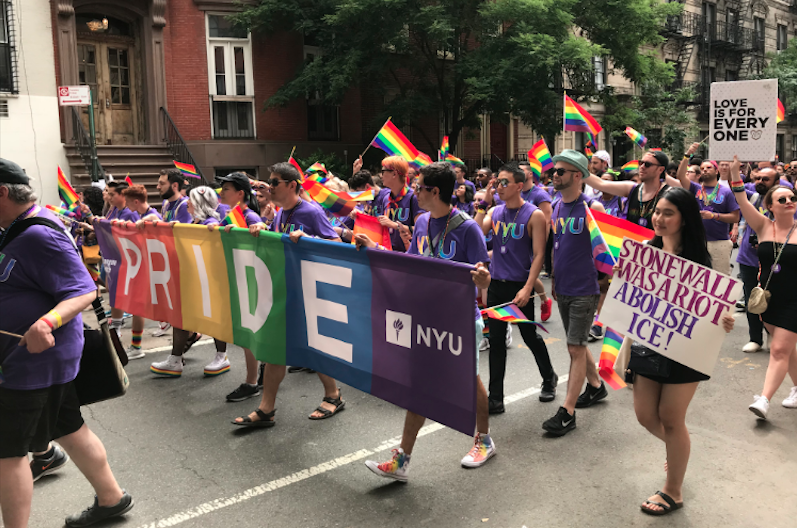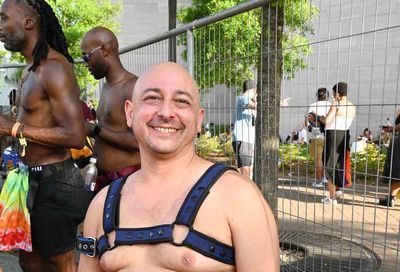LGBTQ people in Afghanistan face violence, rape and extortion, say human rights watchdogs
Interviews with 60 LGBTQ Afghans reveal that conditions have "dramatically worsened" since the Taliban takeover last year.

A recent report by a pair of human rights organizations is warning of the plight of LGBTQ people in Afghanistan, who frequently face threats of violence against them or their families, are targeted for rape, or find themselves being blackmailed ever since the Taliban took over the country last year.
According to the report, from Human Rights Watch and OutRight Action International, conditions have “dramatically worsened” for LGBTQ people in Afghanistan — even though the country was never overly welcoming or accepting of homosexuality or transgender identity when the U.S.-supported government was in charge. In fact, same-sex relations were criminalized under the old regime, just as they are under the Taliban — although the Taliban appears more willing to met out extrajudicial violence against those suspected of being LGBTQ.
“The danger now facing LGBT people in Afghanistan — in an environment devoid of legal protections, under authorities that have explicitly pledged not to tolerate LGBT people — is grave,” the report’s authors state.
The report included interviews of 60 LGBTQ Afghans conducted between October and December of last year. Respondents frequently report facing threats of violence or being outed by Taliban members — including other LGBTQ individuals and even past sexual or romantic partners who have since joined the Taliban to spare their own lives. Those who wear clothes that do not conform to gender norms are regularly beaten on the street, and some people are even coerced into sexual servitude by members of the Taliban or high-ranking government officials.
Many of the interviewees said they had been “attacked, sexually assaulted, or directly threatened by members of the Taliban because of their sexual orientation or gender identity.” Still others face regular abuse from family members, neighbors, and other close contacts who either support the Taliban or believe they must take action against LGBTQ people in order to ensure their own safety.
Of the 60 interviewees, most have remained in Afghanistan, with some others fleeing to nearby countries where they are in danger of being returned to Afghanistan. Only a handful have resettled in countries where they feel safe. Complicating the matter is that many LGBTQ Afghans may lack the financial resources or documentation needed to leave the country, making it practically logistically impossible to flee or seek asylum elsewhere.
The report notes that male homosexuality has a well-documented history in Afghanistan, although due to criminal laws and religious mores it is taboo to mention it. However, the report notes that “sex between men is an open secret,” and has often been tolerated — even under the Taliban — when those involved are prominent or powerful societal figures.
One of those LGBTQ individuals interviewed for the report, 20-year-old Ramiz S., reported that he was raped after being unable to pass through several security checkpoints, manned by Taliban fighters, on his way to pick up his paycheck. At the second checkpoint, he was physically assaulted, punched in the throat to keep him silent, loaded into a car, and taken to a remote location where four men whipped and gang-raped him over the course of eight hours. Upon his release, the men threatened to repeat the deed, telling him: “From now on anytime we want to be able to find you, we will. And we will do whatever we want with you.”
Another interviewee, 23-year-old Baran B., said he received texts on his cell phone from an unknown number. The messages included threats against him and demanded that they meet in person. When Baran met the man sending the texts in person, the man raped him, identified himself as a member of the Taliban, and threatened to tell his superiors or kill Baran if Baran told anyone about the attack. Unfortunately, Baran’s family turned on him and threatened to kill him themselves after learning of the rape, and Baran was forced to leave his hometown.
Brushna Y., a lesbian, was forced to flee her small village after a cousin discovered she was in a same-sex relationship. She fled to her parents’ house in the city, and was soon forced into an engagement with a man who didn’t know she was a lesbian. Brushna ended up marrying the man, and the two emigrated to a nearby country under the guise of having a better chance to find work. But one of her cousins emigrated to the same country and informed her husband of her same-sex relationship. Her husband now beats her nearly every day and she is forbidden to leave the house and can only use the phone when he is not at home.
Another interviewee, Zia H., met up with a man with whom he had been sexually involved following the fall of the U.S. supported government, only to find his lover had joined the Taliban.
“He called me and said meet me right now and I went. He was so different,” Zia recalled, noting that the man even changed his style of dress from Western clothing to a traditional loose-fitting tunic and pants, a traditional hat, and a camouflage jacket. “When I saw him, I was shocked for a minute. I said, ‘You really joined the Taliban?'”
The man said he had, and wanted Zia to work with him, telling him: “It’s fun to have power over people and use it.” Zia refused and has since blocked the man’s number, but constantly worries about being outed to other Taliban members as revenge.

For some LGBTQ Afghans, technology is more a curse than a blessing. Interviewees talked of destroying sim cards, wiping social media profiles, and deleting their phone’s caches in order to avoid being outed at checkpoints, noting that Taliban forces often check cell phones at checkpoints. Facebook and Instagram accounts weren’t safe, and WhatsApp, an app used for one-to-one and group messaging, was targeted by impostors seeking to entrap LGBT people.
Some Afghans who had uploaded videos to YouTube or TikTok to build their brands — whether in media, entertainment, or sex work — reported deleting their profiles, but fear that some of their videos are still circulating online. A few alleged that they’d been contacted by individuals on Grindr seeking to entrap them, especially following the Taliban takeover.
A 25-year-old bisexual man interviewed for the report said he began receiving threats after someone he was in a relationship with shared their private messages with his friends. Since then, the man has received various threats through blocked numbers, newly created Facebook accounts, or messages on other social media platforms, with some even trying to blackmail him. One person he chatted with on Grindr following the Taliban takeover of Kabul befriended him, only to later tell him: “This is a crime. The government has changed and there is Sharia [Islamic law].”
Still others reported facing blackmail or extortion in exchange for sex, with schoolmates or even relatives demanding sexual gratification in exchange for not outing LGBTQ individuals to Taliban forces. One interviewee, Nasrullah B., recalled meeting a man for a date only to discover the man belonged to a militia. The man then proceeded to show Nasrullah pictures of gay men he had beaten up, as well as other disturbing content. Nasrullah said he was desperate to escape, and was forced to pretend that he agreed with the man’s statements and actions in order to avoid angering him.
The report authors also made several recommendations for how to address the plight of LGBTQ people living in Afghanistan, including demanding that the Taliban-controlled nation abide by its responsibilities under various treaties, agreements, or U.N. conventions to which it has previously agreed.
“The Taliban, as Afghanistan’s de facto authorities, are obligated to respect and protect the human rights of LGBT people under international human rights law. This requires the Taliban to address the conditions that give rise to discrimination and violence as well as incidence of abuse,” the report reads. “They also are obligated to ensure that the victims of abuse have access to adequate support and redress, including appropriately punishing those responsible for abuses. … International human rights law protects the right to life and prohibits arrest and detention, torture and other cruel, inhuman or degrading treatment, including rape and other sexual violence, on the basis of sexual orientation.”
The authors recommend that other nations use diplomatic leverage to urge the Taliban to recognize the rights of everyone in Afghanistan, including LGBTQ Afghans and have advised neighboring countries to expedite LGBTQ Afghans’ applications for evacuation and resettlement on the grounds that they face persecution in Afghanistan. They also urge those neighboring countries to allow civil society organizations, including LGBTQ organizations, to assist LGBTQ Afghan refugees without interference from the government, and recommend that neighboring countries end discrimination based on sexual orientation or gender identity and repeal laws criminalizing same-sex conduct.
Human Rights Watch and OutRight Action International have also advised nations dealing with Afghan asylum seekers to take into account the human rights violations that have taken place under Taliban rule — as well as hostile attitudes held by larger Afghan society — when considering claims seeking asylum. They also note that government officials weighing those claims need to take into consideration that LGBT individuals “often conform to societal norms, such as entering into different-sex marriage, in order to survive.” Therefore, they argue that marital status alone should not be taken as “proof” that someone is not LGBT and therefore ineligible for asylum.
The report’s authors also provided several recommendations to digital platforms and social media companies, urging them to engage with pro-LGBTQ organizations to develop policies and features, including content moderation and safety precautions, to ensure LGBTQ Afghans are not put at further risk.
Among those recommendations are that apps and social media platforms take steps to remove and block abusive content, establish direct lines of communication between users and local advocacy or support groups to address problems (such as abuse of the platform by actors seeking to entrap or threaten LGBTQ users) rapidly and in real time, and change geolocation features to shield LGBTQ users from stalking or harm that could result if their physical location is known. The authors also suggest introducing disappearing messages on all applications and app-cloaking through a feature that automatically deletes the app and its content in case of danger to the user.
Support Metro Weekly’s Journalism
These are challenging times for news organizations. And yet it’s crucial we stay active and provide vital resources and information to both our local readers and the world. So won’t you please take a moment and consider supporting Metro Weekly with a membership? For as little as $5 a month, you can help ensure Metro Weekly magazine and MetroWeekly.com remain free, viable resources as we provide the best, most diverse, culturally-resonant LGBTQ coverage in both the D.C. region and around the world. Memberships come with exclusive perks and discounts, your own personal digital delivery of each week’s magazine (and an archive), access to our Member's Lounge when it launches this fall, and exclusive members-only items like Metro Weekly Membership Mugs and Tote Bags! Check out all our membership levels here and please join us today!



























You must be logged in to post a comment.